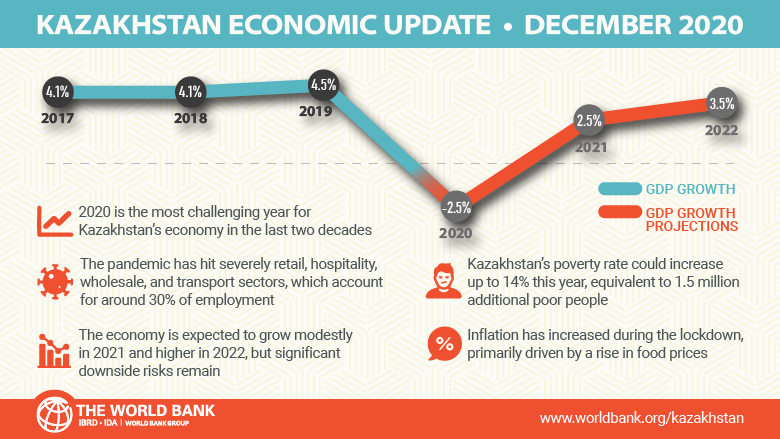Kazakhstan's economy is expected to grow modestly by 2.5 percent in 2021 and support higher growth by 3.5 percent in 2022, but significant downside risks remain due to uneven worldwide economic recovery and higher debt-related risks on the global financial market. These key finding of the World Bank's latest Kazakhstan Economic Update - A slow recovery through the COVID-19 crisis, were discussed today at an online event with participation of national experts.
World Bank experts name 2020 as the most challenging year for Kazakhstan's economy in the last two decades. The fallout of the COVID-19 pandemic has hit the economy harder than the crises in 2008 and 2015. The spread of the pandemic halted global activity in the second quarter of 2020 and depressed global demand and price of oil, which is Kazakhstan's main export commodity. The pandemic also significantly depressed domestic economic activities, with the national economy projected to shrink by 2.5 percent in 2020.
"The economy is expected to grow modestly in 2021 based on an improved global economic outlook, higher demand for exports, resumption of domestic economic activities, and higher disposable income," said Sjamsu Rahardja, Senior Economist, World Bank Country Office in Kazakhstan. "The risks to the economy are on the downside. However, smooth implementation of COVID-19 vaccinations and continuation of the economic reforms are important for sustaining growth."
Experts highlight that the depressed economy will hit the most vulnerable. The pandemic has severely impacted the retail, hospitality, wholesale, and transport sectors, which account for around 30 percent of employment in cities: however, the country's rural population will experience the strongest shock. According to World Bank estimates, Kazakhstan's poverty rate will increase to 12-14 percent in 2020 from a baseline of 6 percent in 2016.
"The most significant increase in the number of the poor is expected to come from rural areas, which threatens to increase inequality in Kazakhstan," said Jean-Francois Marteau, World Bank Country Manager for Kazakhstan. "The country's average GDP growth has declined after each economic crisis, weighed down by the lackluster productivity growth and over-dependency on hydrocarbons. Therefore, more than ever, Kazakhstan needs to focus on delivering reforms for inclusive economic recovery and higher productivity, as well as ensuring the effectiveness of government programs."
Panel experts discussed the factors that impact the Kazakh economy's path to recovery, potential policy response to enhance resilience of the Kazakh economy, as well as the emerging challenges, such as increasing poverty, weaker global demand for fossil fuels, higher regional competition to attract investments, and higher risks of instability in the financial sector.
At the same time, Chairperson of Corporate Fund "NAC Analytica" Aktoty Aitzhanova was more optimistic on the growth projections, stating that "Given the assumption on oil price and world trade, real GDP of Kazakhstan is expected to contract 2.5 percent in 2020 before recovering by 4.0 percentin 2021. The domestic output is expected to reach its pre-pandemic level in quarter 3 of 2021."
The Kazakhstan authorities have implemented strong policy measures to minimize the pandemic's impact on people and the economy. The Panel discussed the support given to firms and poor households. In this regard, Olzhas Khudaibergenov, Founder & Senior Partner of Center for Strategic Initiatives (CSI) highlighted that "Measures to support the Kazakh economy during the pandemic should not be short-term. They should assume that the pandemic will have an impact for another 2-3 years."
Experts agreed on the urgency to addressing the long-standing problems that diminish productivity growth and strengthening the quality of social measures to protect the most vulnerable.
This edition of the country economic update is part of a semi-annual series designed to monitor socio-economic developments in Kazakhstan.







